Cascadian Zen: Bioregional Writings on Cascadia Here & Now
Written by: Paul E. Nelson & Tetsuzen Jason M. Wirth
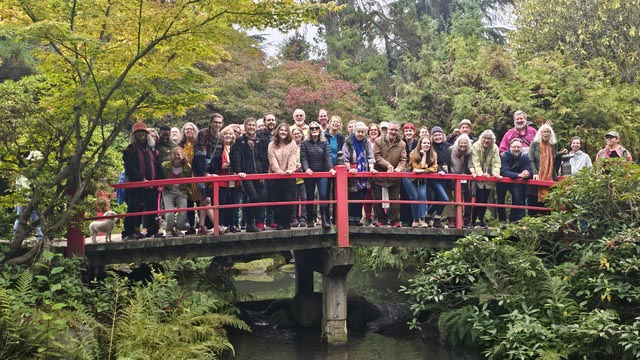
Jason Wirth led a tour of Kubota Garden south of Seattle, as part of the fall Cascadia Poetry Festival 7. Wirth is a docent at the garden, and co-edited a book about it.
Photos by Philip Brautigam, Lauren Grosskopf, Gary Hamilton, Roberta Hoffman, Elizabeth Sykes, Michael Dylan Welch
Buddhist practitioners may be happy to know that we have released the first volume of a collection of poems, essays, interviews, and artworks, which are inspired by the spirit of Eihei Dōgen, but centered here in our bioregion of Cascadia.
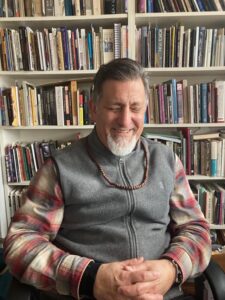
The book is called “Cascadian Zen: Bioregional Writings on Cascadia Here and Now,” and it is the inaugural imprint of Watershed Press, located in Seattle.
Eihei Dogen, (1200–1253), was the founder of the Soto Zen school in Japan. One of his many famous statements is, “When you find your place where you are, practice occurs, actualizing the fundamental point.”
In calling this collection “Cascadian Zen,” we are not claiming that Zen is the only way to awaken to the Cascadian causes and conditions that constitute and sustain us. Although bioregional practice could and should include any Buddhist practice, it does not have to be explicitly or self-consciously Buddhist.
Many of the world’s spiritual practices have valuable resources to aid in opening the “self,” to the concrete and local conditions that comprise the community that supports one. In this respect, the word “Zen” in our book is shorthand for any practice for awakening, awareness, mindfulness, and care, for the place and time of the ecological self.
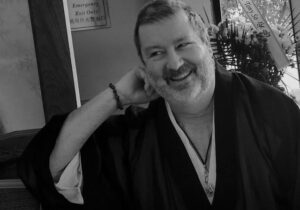
The original idea for the book and Watershed Press came from a small, literary arts organization called The Cascadia Poetics Lab. It is based in the Rainier Beach neighborhood in Seattle—we celebrate our 30th anniversary in December 2023—and its mission is “Empowering people to practice poetry & deepen connections to place, self & the present moment.”
If THAT does not sound like Zen, what does? The editors are not sure, but they agree that one of the main causes of the current “great unravelling,” is the disconnection from place, and the failure of practice to respond to it. Without connection to place, the fundamental point is not actualized, and we spiral into further paroxysms of violence, inequality, and environmental degradation.
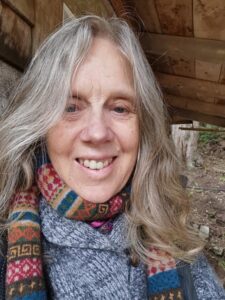
The book’s editors are Paul E. Nelson, the founding director of the Cascadia Poetics Lab; Dr. Tetsuzen Jason M. Wirth, chair of philosophy at Seattle University and a Soto Zen priest; and Adelia MacWilliam, a published poet living on Vancouver Island, B.C.
The collection features poets, philosophers, activists and indigenous leaders like Sam Hamill, Jane Hirshfield, Diane di Prima, Joanne Kyger, Gary Snyder, Michael McClure, Tess Gallagher, Zenshin Philip Whalen, Robert Sund, Wedlidi Speck, Rena Priest, Robert Michael Pyle, Andrew Schelling, Jan Zwicky, Robert Bringhurst, Red Pine, Daphne Marlatt, and many others. It also features many artistic images, including works by indigenous artists Susan Point and Rick Bartow, as well as by other well-known artists like Richard Wagener and Nathan Wirth.
The book is the product of a nearly four-year collaboration with the book designer, Theresa Whitehill. It attempts to answer questions like:
- What is the nature of the bioregion known as Cascadia?
- How is this insight expressed by the people who live, work, practice and play here?
- Is there a connection between Zen practice, broadly construed, and the Cascadia bioregion? If so, what is it?
- Who have been the teachers in the relatively short time Zen has been known in this bioregion?
- What role does water play here, more so than in other bioregions, and what implications does that have for the people who live here, for their practice?
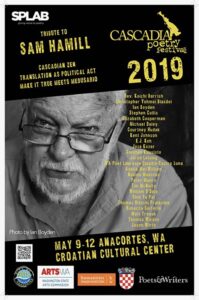
Early response to the book has been enthusiastic. Author Bill Porter (Red Pine), for example, wrote that the book “is a veritable and monumental candy store. Should be around for a long, long time…” Poet Jane Hirshfield called it “marvelous.”
In reflecting on the inspiration of such an ambitious project, we recall the words of Zen Master Dōgen: “Miracles are practiced three thousand times in the morning and eight hundred times in the evening.”
The Cascadia Poetics Lab started out as an organization that produced and syndicated public affairs radio interview programs, interviewing people, many of them poets, largely espousing whole-systems approaches to issues. By 2009 the organization had moved from Auburn, Washington, to Seattle, and had become poetry-centric.
Sam Hamill, the poet, Basho translator, and founder of Copper Canyon Press, was an early supporter, thrice interviewed on the syndicated radio program. He was a headliner of the first Cascadia Poetry Festival in Seattle, and helped advise the organization during its early formation.
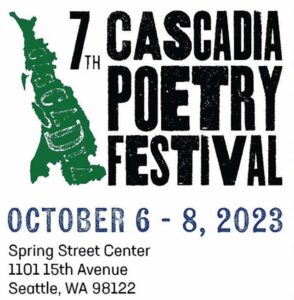
The first “Cascadian Zen” panel took place during the 2019 Cascadia Poetry Festival in Anacortes, Washington. It was produced and moderated by Jason Wirth, who became a board member of the Cascadia Poetics Lab in 2020, and hosted a Cascadian Zen conference at Seattle University.
The pandemic gave the three “Cascadian Zen,” editors plenty of time to work on translating these initial explorations into a major project. Nelson and Wirth were joined by the Canadian poet Adelia MacWilliam, who helped them realize their ambition to transcend the political bifurcation of Cascadia into two national territories. The editors attempted to be like Zen clouds that move as bioregional conditions permit, rather than as national borders allow. This was another example of our practice of speaking from and toward place, as an initial practice of decolonizing Cascadia.
The second volume of Cascadian Zen is due to appear in the autumn of 2024, and, as we learn of important voices that we missed in the construction of the first two volumes, we hope to include them in a proposed third volume.
If you are interested in learning more about Cascadian Zen, or in purchasing a copy, see: Cascadia Poetics Lab
Paul E. Nelson founded the Cascadia Poetics LAB & the Cascadia Poetry Festival. Paul’s books include “Haibun de la Serna”, “A Time Before Slaughter/Pig War: & Other Songs of Cascadia,” “American Prophets (interviews 1994-2012),” “American Sentences”, “A Time Before Slaughter,” and “Organic in Cascadia: A Sequence of Energies.” As co-editor of “Cascadian Zen Volume I: Bioregional Writings on Cascadia Here and Now” and other anthologies, he serves as literary executor for the late poet Sam Hamill, and is a member of the Eishoji Temple in Rainier Beach.
Tetsuzen Jason M. Wirth is professor of philosophy at Seattle University, and works and teaches in the areas of continental philosophy, Buddhist philosophy, aesthetics, environmental philosophy, and Africana philosophy. His recent books include: “Nietzsche and Other Buddhas: Philosophy after Comparative Philosophy,” “Mountains, Rivers, and the Great Earth: Reading Gary Snyder and Dōgen in an Age of Ecological Crisis,” a monograph on Milan Kundera, “Commiserating with Devastated Things,” “Schelling’s Practice of the Wild,” and the co-edited volume (with Bret Davis and Brian Schroeder), “Japanese and Continental Philosophy: Conversations with the Kyoto School.”
